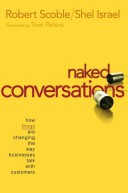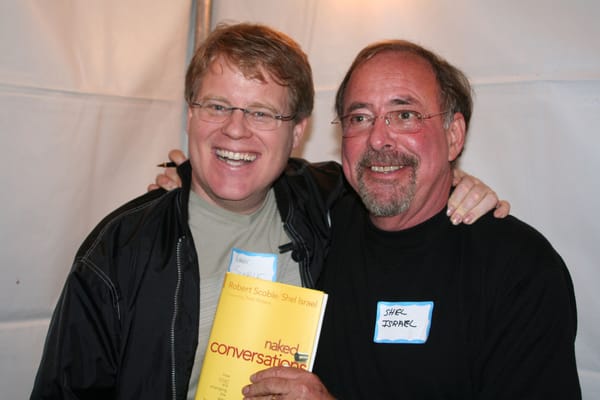On 13 August 2025, the sad news emerged on LinkedIn and elsewhere online that Shel Israel, US author, writer, and an early chronicler of social media’s potential, had died as a consequence of a car accident in Florida in June. I was shocked at the news.
I first met Shel online in early 2005, when “social media” wasn’t yet the term we used. Back then, it was just called blogging. Shel, co-author with Robert Scoble of the seminal 2006 book Naked Conversations, was busy interviewing people from around the world who were exploring the possibilities of this new medium. I was one of them.
Our conversation became part of a chapter in the book and remains online today (and on this page in case that link stops working).
Shel’s career from the advent of social media went far beyond that first book. He wrote and co-wrote Twitterville, The Fourth Transformation, Age of Context, and Lethal Generosity – each provocative, questioning, and exploring the human side of technological change.
Reading our 2005 interview again this week – for the first time in 20 years – brought back the atmosphere of that moment in time when blogging was the centre of online conversation and the future of social media was still taking shape.
Looking Back at 2005
In 2005, the landscape was smaller and slower. Blogs were the primary open platform for conversation. The biggest challenges were learning the tools, finding your voice, and connecting with others who shared your interests.
In the interview, I described blogging as “my persona… my marketing and brand vehicle,” with no brochures, no flyers, and no traditional website – just the blog. I talked about technology as “the great enabler” and about a new way of building relationships based on trust formed through public dialogue, sometimes before meeting face-to-face.
“Technology is the great enabler, facilitating global, immediate, pervasive and persistent communication… anyone can communicate with anyone else, from anywhere on the planet.”
Shel’s questions touched on openness across cultures, the leap of faith in forming relationships online, and how emerging tools like podcasting might change communication. They were as much about people as about technology – about curiosity, connection, and openness.
What’s Changed?
Looking at 2025, the differences are clear:
- Scale and noise: then, thousands of bloggers; now, billions of users across countless platforms – 5.04 billion at the start of 2024 – with algorithms amplifying both information and misinformation.
- Medium: then, mostly long-form text and thoughtful comment threads; now, short video clips, memes, live streams, and AI-generated posts dominate.
- Culture: then, an optimism and curiosity about connecting; now, more polarisation, distrust, and bad actors seeking to manipulate the conversation.
- Technology: then, RSS feeds, blogrolls, and trackbacks; now, AI-curated feeds, private groups, and personalised recommendations.
“In the new way, you find out a little about somebody through a blog – and that’s plenty to begin a business relationship, even before you meet face-to-face.”
The Constants – What Hasn’t Changed
And yet, the fundamentals remain:
- People still want to connect, share, and be heard.
- Trust, transparency, and authenticity still matter.
- Technology still acts as an enabler rather than a substitute for genuine human connection.
- Every medium still has both its champions and its exploiters.
Shel’s Questions for Today
What strikes me most is that many of the questions Shel asked me in 2005 could be asked, unchanged, today. For example:
- Why did you start sharing online?
- How has it changed who you are and what you do?
- How do openness and trust vary across different cultures?
- How can new tools open up communication in organisations?
The answers would, of course, reflect today’s technologies and cultural dynamics – but they would still centre on curiosity, the desire to connect, and the value of conversation.
See if you agree with my assessment on what's changed, and what hasn’t, since 2005.
Carrying Forward the Spirit of the Conversation
Shel Israel’s gift was framing online communication as a human activity first, and a technical one second. That perspective feels just as compelling in 2025 as it did in 2005.
The platforms have changed. The tools have changed. The speed, the scale, and the noise have all multiplied. But the essential human desire to talk, listen, and connect has not.
If there’s one lesson from revisiting that 2005 interview, it’s that our responsibility as participants – and communicators – is to make those connections meaningful, respectful, and real.
This article is my way of recognising Shel for asking the questions that still matter today, and for reminding us to see the internet not only as a network of machines, but also as a network of people.
Shel was also, quite simply, a nice person, often describing himself in that self-deprecating way as “a nice guy.”
“Shel was generous with his time, warm in his encouragement, and simply a pleasure to have known.”
His passing is a sadness for all who valued his kindness as much as his sharp mind.
Related Listening:
On 23 November 2005, Shel Holtz and I published our podcast review of Naked Conversations ahead of the book's publication in January 2006.
The link above is to the show notes on our archive podcast blog. The actual MP3 audio is no longer available there, but it's embedded below if you want to listen to our 31-minute discussion from nearly 20 years ago.





















